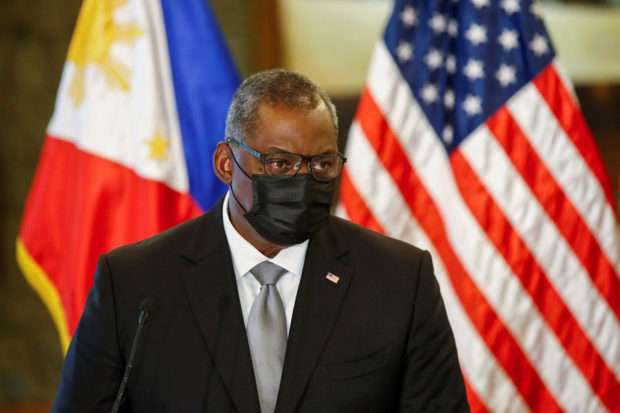
US Defense Secretary Lloyd Austin speaks during a news conference after a bilateral meeting with Philippines’ Defense officials at Camp Aguinaldo in this photo taken on July 30, 2021. (File photo by ROLEX DELA PEÑA / Reuter)
MANILA, Philippines — Although details about the expansion of the Enhanced Defense Cooperation Agreement (Edca) remain vague, the United States vows to ensure that the terms of rotations and number of troops in the four additional Edca sites will be a “joint decision” with the Philippines.
US Secretary of Defense Lloyd Austin said this Wednesday during a presser following his “2+2” ministerial dialogue in Washington with US Secretary of State Antony Blinken, Philippine Foreign Affairs Secretary Enrique Manalo, and Philippine Defense Secretary Carlito Galvez Jr.
“I think it’s too early to try to discuss specific numbers and timing of rotations, but certainly, these are things that Secretary Galvez and I will continue to work on going forward…I would finally emphasize that whatever we do in terms of rotations and numbers of troops, it is a joint decision between the Philippine government and the US government,” Austin said.
Aside from enhancing the military capacity of the American and Philippine militaries, Austin said it would also allow the US to “meet the needs of the Philippines in the event of a crisis like a natural disaster or a requirement to rapidly provide humanitarian assistance.”
It will also play a crucial role in strengthening their “combined deterrence posture,” he added.
According to Austin, the US is expected to allocate more than $100 million for infrastructure investments in the new and existing Edca sites by the end of the fiscal year 2023.
“Those investments will spur job creation and economic growth in local Philippine communities,” he noted.
Edca was signed by Washington and Manila in 2014, allowing US troops and equipment to be prepositioned in several locations across the Philippines.
Last week, Malacañang identified four new Edca sites despite a warning from China that the additional locations would “seriously harm” the Philippines.
‘Much work has to be done’
Manalo reiterated that “much work still has to be done” in ironing out the implementation of the expanded Edca.
“We have to identify the terms of reference, and how these activities will be undertaken. So I don’t think we’re really at any stage to answer how they might be used, that’s still open to discussion,” he said.
But he noted that both countries agree that the main purpose of the new Edca sites would be “to address humanitarian and disaster-related events, to increase and improve…training of Filipino and American assets, and also to improve interoperability and perhaps, respond to other types of security challenges.”
Deepening defense ties
Austin further said that the US and the Philippines were “committed to swiftly finalizing” bilateral defense guidelines “which chart our vision for alliance cooperation across all operation domains, including space and cyberspace.”
“We also discussed near-term plans to complete a security sector assistance roadmap to support the delivery of priority defense platforms for the next five to 10 years, including radars, unmanned aerial systems, military transport aircraft, and coastal and air defense systems,” he added.
According to Austin, the two countries are building on around 500 defense engagements that their militaries hold every year.
“We’re forging new ties between our militaries and expanding the breadth of our cooperation,” Austin said.
The third-ever “2+2” ministerial dialogue between the two longtime allies — and their first in seven years — came after the Philippines identified the additional Edca sites and the kick-off of the largest-ever Balikatan (shoulder-to-shoulder) military exercise between the Philippines and US armies.
It also fell against the backdrop of flared-up tensions in the region, especially between China and US-backed Taiwan, which Beijing claims and threatens to retake by force, if necessary.

